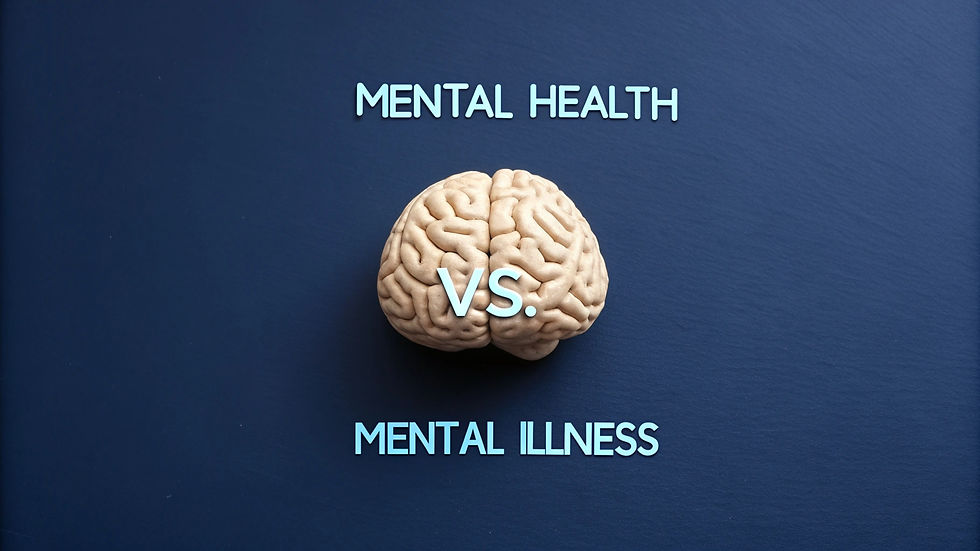What Is the Difference Between Mental Health and Mental Illness?
- Seo Services
- Jul 24, 2025
- 3 min read

Conversations about mental health and mental illness are finally becoming more common. But even though these terms pop up more often, there’s still confusion about what they really mean. Understanding the difference between mental health and mental illness can make it easier to support yourself and others who might be struggling.
Here's the thing: mental health and mental illness are closely related—but they're definitely not the same.
What is Mental Health?
Mental health is about your overall emotional, psychological, and social well-being. Think of it like physical health, but for your mind and emotions. Good mental health means you're generally able to handle life's ups and downs, maintain healthy relationships, make sound decisions, and feel emotionally balanced.
Your mental health changes with circumstances. It can improve or decline depending on things like stress, relationships, sleep quality, or your physical health.
Being mentally healthy doesn't mean you're happy all the time—it means you can manage tough moments, recover from setbacks, and move forward.
What is Mental Illness?
Mental illness, on the other hand, refers to specific conditions that significantly impact a person’s thinking, emotions, or behavior over a sustained period. Unlike short-term stress or sadness, mental illnesses usually last longer and affect your ability to function in daily life.
Common mental illnesses include depression, anxiety disorders, bipolar disorder, schizophrenia, PTSD, and eating disorders. Each comes with unique symptoms, but generally, mental illnesses can disrupt how you perceive yourself, how you interact with others, and how you cope with stress.
It's important to note: having a mental illness doesn't automatically mean you can't have good mental health at times. Many people with mental illness live fulfilling lives with periods of great emotional wellness.
Mental Health vs Mental Illness: The Key Differences
Here's a quick breakdown:
Mental Health: Refers to your overall emotional and psychological well-being. It fluctuates with life experiences, stress levels, and coping skills.
Mental Illness: Involves specific, diagnosable conditions affecting how you think, feel, and act consistently over time, often requiring professional support.
Can You Have Good Mental Health With a Mental Illness?
Yes, absolutely. Just like someone with a chronic physical condition (e.g., diabetes) can have periods of good physical health, people with mental illnesses can and do experience periods of good mental health. With proper care, treatment, and support, it's entirely possible to thrive despite mental illness.
Why Understanding the Difference Matters
Confusing mental health and mental illness can lead to stigma, misunderstanding, and missed opportunities to get or offer help. Recognizing the distinction helps reduce judgment around mental illnesses and encourages a healthier conversation about emotional wellness.
When we clearly understand these differences, we make it easier for people to talk openly, seek help, and support each other without stigma or shame.(source)
When Should You Seek Help?
It's always beneficial to be proactive about mental health. However, consider reaching out for professional help if you or someone you know:
Experiences persistent sadness, anxiety, or hopelessness
Has difficulty performing daily tasks or responsibilities
Withdraws from social interactions
Feels overwhelmed regularly
Shows significant changes in behavior, sleep, or appetite
Getting support early can make a huge difference.
Frequently Asked Questions (FAQs)
Can mental illness be cured? While some mental illnesses can be fully treated, others may require ongoing management. Many people benefit from a comprehensive approach that includes therapy, medication, and lifestyle adjustments. Accessing psychiatric services in Maryland can provide tailored treatment plans designed to meet individual needs, helping patients manage symptoms and improve quality of life.
How common is mental illness?Mental illnesses are very common, affecting millions of individuals across all age groups. Anxiety disorders, depression, and mood disorders are among the most prevalent. Fortunately, many residents benefit from health solutions of maryland, which offer early diagnosis and ongoing care to support long-term mental health.
What can I do to improve my mental health? You can boost your mental health by practicing self-care, staying physically active, building strong social connections, managing stress effectively, getting quality sleep, and seeking professional help if needed.
Is it normal to have ups and downs in mental health? Yes, ups and downs are entirely normal. Life naturally involves emotional highs and lows. Mental wellness is about managing these fluctuations effectively.
👉 Now Accepting New Patients! Take the first step toward a better future—Contact us today!
.png)



Comments